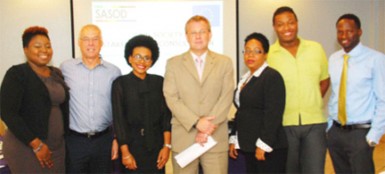Several civil society organisations (CSOs) are now better equipped to advocate for marginalised groups following the conclusion of a two-day conference on human rights policies.
The conference, hosted by the Society against Sexual Orientation Discrimination (SASOD), was also deemed “timely” with general and regional elections less than three weeks away.
According to a release from SASOD, the conference saw representatives from civil society groups working with marginalised communities, the diplomatic corps and the United Nations turning out from April 16 to April 18 at the Grand Coastal Hotel.

The consultation was aimed at building civil society capacity to better engage policy decision-makers at all levels of government and was a part of the Guyanese Vulnerable Communities Capacities Strengthening Project.
In his address, Head of the Delegation to European Union (EU) to Guyana Ambassador Robert Kopecky emphasised that human rights needed to be defended. He said too that civil society played a vital role in linking the general public with policy-makers.
Ambassador Kopecky further extended compliments to SASOD and other CSOs for their “relentless fight” against all forms of discrimination and human rights abuses in Guyana.
Meanwhile, Project Coordinator of SASOD John Quelch noted that elections were quickly drawing nearer. He opined, “Guyanese civil society will now be more equipped to engage the next government and [eleventh] parliament on the marginalised groups we serve.” He added, “We are preparing to take collective and proactive action to have human rights issues addressed now – both during the campaign and when the next government and parliament takes office after the May 11 polls.
We are no longer waiting. Our issues must be addressed now.”
According to Quelch, the recently concluded conference is the first phase of three for the project. He said too that the project, which is funded by the EU, is expected to benefit the work and advocacy of CSOs, particularly in representing vulnerable communities.
The conclusion of the two-day conference also saw the revelation of findings of Baseline and Mapping Studies conducted by consultants from Commonwealth, the Caribbean and Guyana.
SASOD’s release explained that the Baseline Study measures the current level of capacity among Guyanese civil society to engage in public policy advocacy on behalf of vulnerable groups.
Further, the Mapping Studies described the process by which policy decisions are made in the Guyanese context while further highlighting key opportunities for civil society to intervene and participate. Both studies showed that a “rights-based approach” was a necessity for policy reform.
Coming out the consultation will be a specialist training programme on public policy advocacy for local CSOs, which is expected to come on-stream in July.





